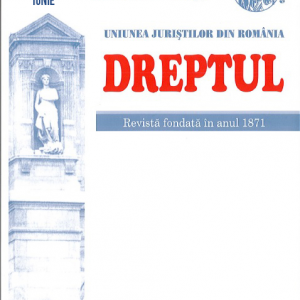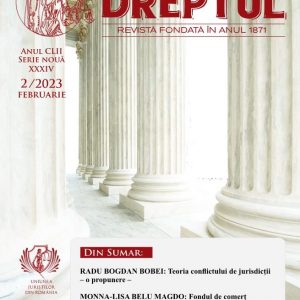-
 Pursuant to the entry into force of the Civil Code (Law no. 287/2009, republished) on October 1, 2011, which repealed the Family Code, has also duly amended Law no. 119/1996 on Civil status documents, republished, and also the entry into force of Law no. 134/2010 on the Code of Civil Procedure, republished, the author examines in this study the legal provisions relating to dissolution of marriage by divorce through court proceedings, making several references to the courts ? recent relevant case law. Thus, this study examines the legal provisions regulated by Articles 373-374 and Articles 379-381 of the Civil Code and Articles 914-934 of the new Code of Civil Procedure.
Pursuant to the entry into force of the Civil Code (Law no. 287/2009, republished) on October 1, 2011, which repealed the Family Code, has also duly amended Law no. 119/1996 on Civil status documents, republished, and also the entry into force of Law no. 134/2010 on the Code of Civil Procedure, republished, the author examines in this study the legal provisions relating to dissolution of marriage by divorce through court proceedings, making several references to the courts ? recent relevant case law. Thus, this study examines the legal provisions regulated by Articles 373-374 and Articles 379-381 of the Civil Code and Articles 914-934 of the new Code of Civil Procedure. -
 After the entry into force of the Civil Code (Law No. 287/2009 republished) on October 1st, 2011, which repealed the Family Code, and the corresponding amendment of Law No. 119/1996 concerning civil status acts, republished, the author examines in this study the legal provisions relating to the dissolution of marriage through divorce by administrative and notary procedure governed by Articles 375-378 of the new Romanian Civil Code.
After the entry into force of the Civil Code (Law No. 287/2009 republished) on October 1st, 2011, which repealed the Family Code, and the corresponding amendment of Law No. 119/1996 concerning civil status acts, republished, the author examines in this study the legal provisions relating to the dissolution of marriage through divorce by administrative and notary procedure governed by Articles 375-378 of the new Romanian Civil Code. -

-
 The aim of this paper is to identify how and if cultural diversity, as a fundamental and moral value of the EU, is effectively protected by EU law. I will start from the EU competences on cultural matters and try to find out if, while dealing with cultural issues, the EU is actually protecting its “unity without uniformity” and its “diversity without fragmentation”. The recent and stronger intervention of the EU in cultural matters, after Lisbon, raises questions as to its real aims, be it the building of a stronger and stronger “small common denominator” in cultural issues as well, by means of uniformity or the real protection of cultural diversity of its Member States.
The aim of this paper is to identify how and if cultural diversity, as a fundamental and moral value of the EU, is effectively protected by EU law. I will start from the EU competences on cultural matters and try to find out if, while dealing with cultural issues, the EU is actually protecting its “unity without uniformity” and its “diversity without fragmentation”. The recent and stronger intervention of the EU in cultural matters, after Lisbon, raises questions as to its real aims, be it the building of a stronger and stronger “small common denominator” in cultural issues as well, by means of uniformity or the real protection of cultural diversity of its Member States. -
 The refund of the judicial stamp duty, as a result of the admission in whole or in part of an enforcement appeal, is a matter that has generated a non-unitary judicial practice. In this study, the author aims to analyze the way in which the national courts have interpreted and applied the rules governing the appellant’s right to recover the judicial stamp duty, as well as to identify legal solutions in relation to the various hypotheses presented.
The refund of the judicial stamp duty, as a result of the admission in whole or in part of an enforcement appeal, is a matter that has generated a non-unitary judicial practice. In this study, the author aims to analyze the way in which the national courts have interpreted and applied the rules governing the appellant’s right to recover the judicial stamp duty, as well as to identify legal solutions in relation to the various hypotheses presented. -
 Potrivit art. 275 alin. (1) C.pen., sustragerea, distrugerea, reținerea, ascunderea ori alterarea de mijloace materiale de probă sau de înscrisuri, în scopul de a împiedica aflarea adevărului într-o procedură judiciară, se pedepsește cu închisoarea de la 6 luni la 5 ani. Conform art. 198 alin. (1) C.pr.pen., înscrisurile pot servi ca mijloace de probă, dacă, din conținutul lor, rezultă fapte sau împrejurări de natură să contribuie la aflarea adevărului. (cu notă aprobativă). Infracțiunea de sustragere sau distrugere de probe ori de înscrisuri, prevăzută în art. 275 alin. (1) C.pen., are ca situație premisă existența unei proceduri judiciare începute. În ceea ce privește calitatea de subiect activ, autorul faptei prevăzute de legea penală ce face obiectul procesului penal în care sunt folosite înscrisurile ori mijloacele materiale de probă poate fi subiect activ al infracțiunii de sustragere sau distrugere de probe ori de înscrisuri în modalitatea prevăzută în art. 275 alin. (1) C.pen. (Înalta Curte de Casație și Justiție, Completul pentru dezlegarea unor chestiuni de drept în materie penală, Decizia nr. 3 din 20 ianuarie 2021 publicată în Monitorul Oficial al României, Partea I, nr. 396 din 15 aprilie 2021)
Potrivit art. 275 alin. (1) C.pen., sustragerea, distrugerea, reținerea, ascunderea ori alterarea de mijloace materiale de probă sau de înscrisuri, în scopul de a împiedica aflarea adevărului într-o procedură judiciară, se pedepsește cu închisoarea de la 6 luni la 5 ani. Conform art. 198 alin. (1) C.pr.pen., înscrisurile pot servi ca mijloace de probă, dacă, din conținutul lor, rezultă fapte sau împrejurări de natură să contribuie la aflarea adevărului. (cu notă aprobativă). Infracțiunea de sustragere sau distrugere de probe ori de înscrisuri, prevăzută în art. 275 alin. (1) C.pen., are ca situație premisă existența unei proceduri judiciare începute. În ceea ce privește calitatea de subiect activ, autorul faptei prevăzute de legea penală ce face obiectul procesului penal în care sunt folosite înscrisurile ori mijloacele materiale de probă poate fi subiect activ al infracțiunii de sustragere sau distrugere de probe ori de înscrisuri în modalitatea prevăzută în art. 275 alin. (1) C.pen. (Înalta Curte de Casație și Justiție, Completul pentru dezlegarea unor chestiuni de drept în materie penală, Decizia nr. 3 din 20 ianuarie 2021 publicată în Monitorul Oficial al României, Partea I, nr. 396 din 15 aprilie 2021) -

-

-
 The emergence of Decree-Law no. 24/1990 led to conflicting interpretations on the period of application, with no specific provisions in this respect. This prompted the article’s author to appeal to the general principles of criminal law in interpreting the law hereby.
The emergence of Decree-Law no. 24/1990 led to conflicting interpretations on the period of application, with no specific provisions in this respect. This prompted the article’s author to appeal to the general principles of criminal law in interpreting the law hereby. -
 The failure to fulfill the periodical financial or fiscal obligation consisting in source withdrawal taxes or contributions was qualified in time by certain authors, as a continued crime, and by others, as a successive continuous crime. Choosing the last version, the author of this study identified several criteria for making a distinction between the two forms of crime.
The failure to fulfill the periodical financial or fiscal obligation consisting in source withdrawal taxes or contributions was qualified in time by certain authors, as a continued crime, and by others, as a successive continuous crime. Choosing the last version, the author of this study identified several criteria for making a distinction between the two forms of crime. -

-
 Atunci când se instituie măsuri asigurătorii în procesul penal nu este necesar să se indice sau să se dovedească ori să se individualizeze bunurile asupra cărora se înființează măsura asiguratorie. (Înalta Curte de Casație și Justiție, Completul pentru dezlegarea unor chestiuni de drept, Decizia nr. 19/2017 – cu notă critică)
Atunci când se instituie măsuri asigurătorii în procesul penal nu este necesar să se indice sau să se dovedească ori să se individualizeze bunurile asupra cărora se înființează măsura asiguratorie. (Înalta Curte de Casație și Justiție, Completul pentru dezlegarea unor chestiuni de drept, Decizia nr. 19/2017 – cu notă critică)
